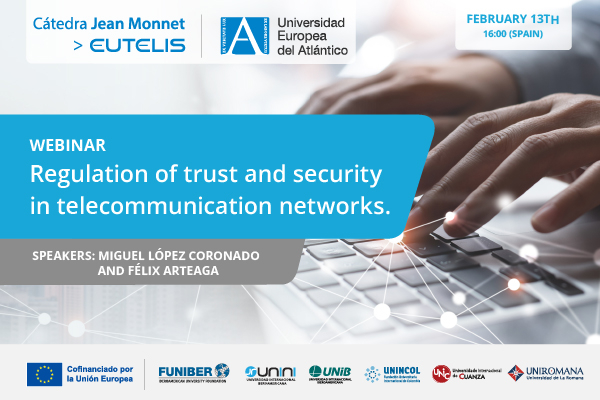
The Universidad Internacional Iberoamericana (International Iberoamerican University, UNIB) will organize, on February 13 at 4:00 p.m. (CET), the webinar: "Regulation of trust and security in telecommunication networks."
The session will be given by Miguel López Coronado and Félix Arteaga and is part of the Jean Monnet Chair "Telecommunications Policy in the EU and the Information Society" held by the Universidad Europea del Atlántico (European University of the Atlantic, UNEATLANTICO).
This topic will deal with the measures established with the aim of achieving a high, common level of security of networks and information systems within the European Union to improve the functioning of the internal market. During the webinar, the 5G Cybersecurity Act will also be discussed as an answer to security issues.
The event also counts with the collaboration of the Iberoamerican University Foundation (FUNIBER), the Universidad Internacional Iberoamericana de México (International Iberoamerican University of Mexico, UNINI Mexico), the International University Foundation of Colombia (International University Foundation of Colombia, UNINCOL), the Universidade Internacional do Cuanza (International University of Cuanza, UNIC), and the Universidad de La Romana (University of La Romana, UNIROMANA).
The conference is free of charge and open to all those interested in the subject. The broadcasting schedule can be consulted at this link. To participate, registration is required:
Registration to the webinar: "Regulation of trust and security in telecommunication networks"
If you are interested in receiving the complete training of the chair, you will find more information at this link. In order to obtain the corresponding certificate of achievement and the credits awarded to this chair, the enrolled students must participate in the design of an application to gamify the learning of the European Union, under the direction and supervision of the professors.
The objectives of the Jean Monnet Chairs, which are specialized teaching positions in European Union studies for university professors and associate professors, are to improve the teaching of EU studies through specialized programs; to conduct, monitor, and supervise research on EU-related topics at all levels of education; to train and advise the next generation of teachers and researchers; and to provide qualified guidance to future professionals in European affairs.

"Funded by the European Union. However, the opinions expressed are the sole responsibility of the author(s) and do not necessarily reflect the views of the European Union or the European Education and Culture Executive Agency (EACEA). Neither the European Union nor the granting authority can be held responsible for them."